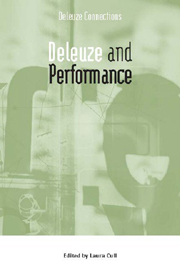Book contents
- Frontmatter
- Contents
- Introduction
- 1 Performing in the Chaosmos: Farts, Follicles, Mathematics and Delirium in Deleuze
- Act I Deleuze on Theatre: Artaud, Beckett and Carmelo Bene
- Interval
- Act II Confronting Deleuze and Live Performance
- 6 Becoming a Citizen of the World: Deleuze Between Allan Kaprow and Adrian Piper
- 7 sub specie durationis
- 8 Thinking Through Theatre
- 9 Becoming–Dinosaur: Collective Process and Movement Aesthetics
- Interval
- Act III A Digital Deleuze: Performance and New Media
- Notes on Contributors
- Index
6 - Becoming a Citizen of the World: Deleuze Between Allan Kaprow and Adrian Piper
from Act II Confronting Deleuze and Live Performance
Published online by Cambridge University Press: 12 September 2012
- Frontmatter
- Contents
- Introduction
- 1 Performing in the Chaosmos: Farts, Follicles, Mathematics and Delirium in Deleuze
- Act I Deleuze on Theatre: Artaud, Beckett and Carmelo Bene
- Interval
- Act II Confronting Deleuze and Live Performance
- 6 Becoming a Citizen of the World: Deleuze Between Allan Kaprow and Adrian Piper
- 7 sub specie durationis
- 8 Thinking Through Theatre
- 9 Becoming–Dinosaur: Collective Process and Movement Aesthetics
- Interval
- Act III A Digital Deleuze: Performance and New Media
- Notes on Contributors
- Index
Summary
Deleuze often remarked on the ‘break’ between The Logic of Sense and Anti-Oedipus. It is a break between the rigorous distinction of the virtual and actual realms in Deleuze's earlier work and the beginning, with Félix Guattari, of ‘trying to find a single basis for a production that was at once social and desiring in a logic of flows’ (Deleuze 1995: 144). This is a move from an ‘expressionism’ by which the ‘actor’ actualises, or ‘dramatises’ the virtual realm, to a ‘constructivism’ of the virtual in the ‘act’. This was, Deleuze says, a shift from the ‘theatre’ to the ‘factory’, a shift from the dramatisation of becoming by the social, to the production of becoming in the social (144). This transition is similar to that found in Allan Kaprow's Happenings, which gradually rejected the expression of a virtual ‘score’ in a theatrical performance, in favour of a ‘blurring’ of the score and its actualisation in a process of composition understood as being ‘life’.
In 1961, Kaprow explains: ‘A Happening is generated in action by a headful of ideas or a flimsily jotted-down score of “root” directions’ (Kaprow 2003: 19). The score and its performance are quite distinct, but they nevertheless exist only in their reciprocal presupposition, the former being purely abstract without the particularity of its instantiation, while its instantiation cannot take place without the ‘diagram’ of its plan.
- Type
- Chapter
- Information
- Deleuze and Performance , pp. 109 - 125Publisher: Edinburgh University PressPrint publication year: 2009



